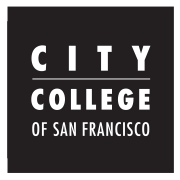The analysis and design of computer algorithms and their underlying data structures. Analysis of the timing and efficiency of algorithms. Study of lists, stacks, queues, trees, backtracking, searching, sorting and recursion.

The analysis and design of computer algorithms and their underlying data structures. Analysis of the timing and efficiency of algorithms. Study of lists, stacks, queues, trees, backtracking, searching, sorting and recursion.
Introduction to graphs, hash tables, heaps, priority queues and direct access files. Further study of abstract data types and object-oriented programming.
San Francisco has always seen itself as a leader in innovation, personal freedom, and self-determination. Perhaps no institution captures those values better than City College of San Francisco.
With 6 active locations woven throughout our city, it has evolved into a multicultural, accessible, and affordable provider of higher education of the highest quality. With an unparalleled selection of classes and accomplished faculty, City College offers over 250 degrees and certificates, transferable credits, online courses, and career advancement classes.
Our Vision
CCSF shall provide a sustainable and accessible environment where we support and encourage student possibilities by building on the vibrancy of San Francisco and where we are guided by the principles of inclusiveness, integrity, innovation, creativity, and quality.
Empowered through resources, collegiality, and public support, the college will provide diverse communities with excellent educational opportunities and services. We will inspire participatory global citizenship grounded in critical thinking and an engaged, forward thinking student body.
Mission Statement
Consistent with our Vision, City College of San Francisco provides educational programs and services that promote student achievement and life-long learning to meet the needs of our diverse community.
Our Primary Mission Is To Provide Programs And Services Leading To
In the pursuit of individual educational goals, students will improve their critical thinking, information competency, communication skills, ethical reasoning, and cultural, social, environmental, and personal awareness and responsibility.
In addition, the college offers other programs and services consistent with our primary mission as resources allow and whenever possible in collaboration with partnering agencies and community-based organizations.
City College of San Francisco belongs to the community and continually strives to provide an accessible, affordable, and high quality education to all its students. The College is committed to providing an array of academic and student development services that support students’ success in attaining their academic, cultural, and civic achievements.
To enhance student success and close equity achievement gaps, the college identifies and regularly assesses student learning outcomes to improve institutional effectiveness. As a part of its commitment to serve as a sustainable community resource, our CCSF mission statement drives institutional planning, decision making and resource allocation.
© 2025 coursetakers.com All Rights Reserved. Terms and Conditions of use | Privacy Policy